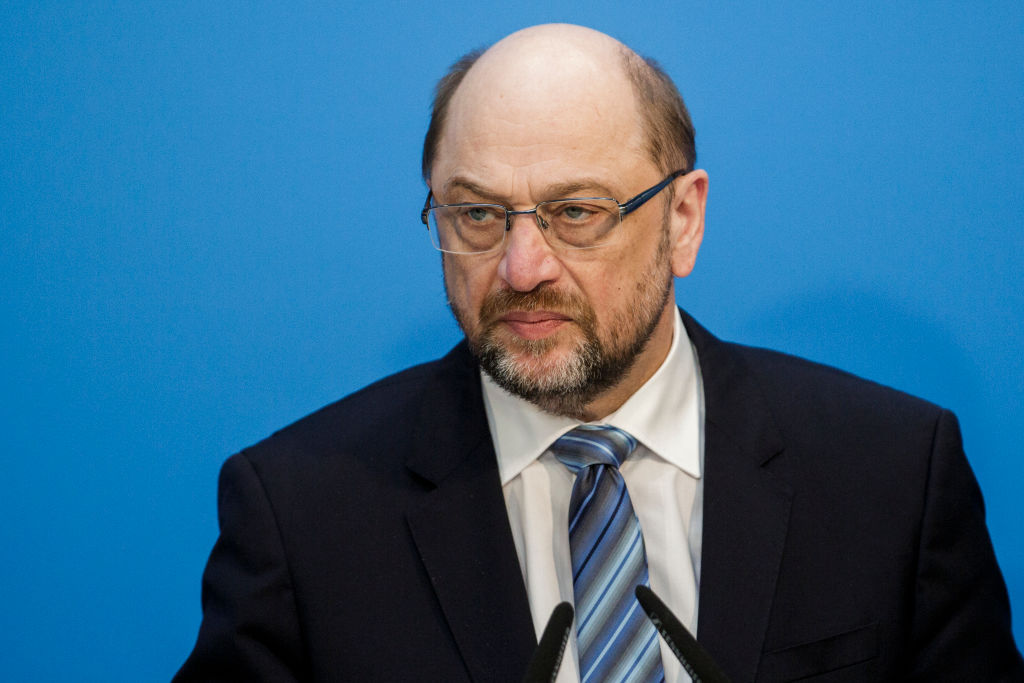Who’d have thought it? Last week, it looked like Martin Schulz had landed the key role of Foreign Minister in Germany’s new coalition government, despite leading his Social Democrats to their worst election result since the war. But now Schulz has been forced to decline the post after an internal revolt by his own party. It’s a sign that people power is returning to German politics, after years of cosy backroom deals.
Up until the weekend, it looked like Schulz had played a weak hand very well. His SPD only polled 20.5% in September’s election, and subsequent opinion polls put them even lower. Yet by sitting out the first round of coalition talks (between Angela Merkel’s Christian Democrats, the Free Democrats and the Greens) he’d ended up in pole position. When those talks broke down, Merkel’s CDU was forced to seek an alliance with his SPD – or risk a fresh election, and an even stronger showing by Germany’s new anti-immigration party, Alternative für Deutschland.
Consequently, Merkel was forced to give Schulz’s SPD a far bigger slice of power than his meagre share of votes and seats normally would have warranted. Her centre-right CDU had to hand over the Finance Ministry to his left-leaning SPD. A plum job as Foreign Minister was Schulz’s personal prize. The SPD could hardly have hoped for a better deal, after such a dismal election. So why have Schulz’s colleagues turned against him, and forced him to stand aside?
The answer is that the SPD fears it will be obliterated if it enters yet another so-called ‘Grand Coalition’ with Merkel’s CDU, and with good reason. As Merkel once told David Cameron, ‘the little party always gets smashed.’ If the SPD goes back into government with the CDU, party members know it must be on completely different terms. Martin Schulz as Foreign Minister sends out the wrong sign to disenchanted voters. It signals more of the same-old same-old. To survive, the SPD needs something new.
To give Schulz his due, it’s clear he understands this. ‘It’s appropriate that my personal ambitions should take a back seat to the interests of the party,’ he’s said. He’s stepping down as party leader, and has endorsed Andrea Nahles as his successor. Aged 47, Nahles is supposed to be the fresh face of the SPD, but the politician making the most noise is a generation younger – SPD Youth Wing leader Kevin Kühnert, aged just 28.
Kühnert has been a passionate opponent of another GroKo (as Germans call these Grand Coalitions) and he enjoys a good deal of support. This week, the SPD’s 464,000 members will vote on whether to endorse this new GroKo, and the result remains uncertain. Twenty five thousand Germans have joined the party in the last few weeks. Normally, the SPD establishment would be rejoicing at this sudden influx, but party bigwigs fear these new members may have signed up to defeat Schulz’s Groko deal.
However the driving force in this debate isn’t Schulz, or Nahles, or even Kühnert, but Alternative für Deutschland. One in eight Germans voted AfD in September. Like a Teutonic UKIP, this new party has taken votes from left and right. AfD’s growing strength has forced the SPD to confront its dwindling appeal. The latest polls put the SPD just a few points ahead of AfD. If AfD were to overtake them, the psychological impact would be huge.
For Merkel’s CDU, the AfD problem is slightly less pressing, but only slightly. Her CDU polled 33% in September, but this was still 9% down on the last election, in 2013, also their worst result since the war. The CDU and the SPD are locked together in a marriage of convenience. With support for AfD growing, neither party wants to gamble on another election – but if Kühnert has his way, this outcome may be forced upon them. Merkel’s favoured option, an alliance between her CDU, the Greens and Christian Lindner’s Free Democrats would have been the best solution for Germany. Lindner’s decision to walk out of those talks is looking more costly by the day.






Comments